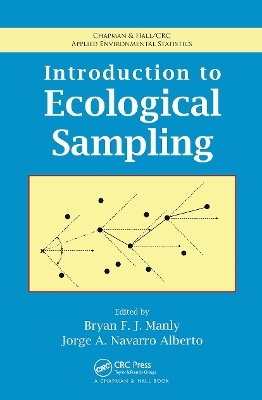
Introduction to Ecological Sampling
Chapman & Hall/CRC (Verlag)
978-1-032-92651-3 (ISBN)
An Easy-to-Understand Treatment of Ecological Sampling Methods and Data Analysis
Including only the necessary mathematical derivations, Introduction to Ecological Sampling shows how to use sampling procedures for ecological and environmental studies. It incorporates both traditional sampling methods and recent developments in environmental and ecological sampling methods.
After an introduction, the book presents standard sampling methods and analyses. Subsequent chapters delve into specialized topics written by well-known researchers. These chapters cover adaptive sampling methods, line transect sampling, removal and change-in-ratio methods, plotless sampling, mark-recapture sampling of closed and open populations, occupancy models, sampling designs for environmental modeling, and trend analysis.
The book explains the methods as simply as possible, keeping equations and their derivations to a minimum. It provides references to important, more advanced sampling methods and analyses. It also directs readers to computer programs that can be used to perform the analyses.
Accessible to biologists, the text only assumes a basic knowledge of statistical methods. It is suitable for an introductory course on methods for collecting and analyzing ecological and environmental data.
Bryan F.J. Manly is a consultant for Western EcoSystems Technology. He was previously a professor of statistics at the University of Otago, Dunedin, New Zealand. His interests focus on aspects of statistics applied to biological problems, particularly in analyses related to organisms in seas and rivers. Jorge A. Navarro Alberto is a professor at the Autonomous University of Yucatan, Mexico, where he teaches statistics and sampling design courses to undergraduate biology students and graduate marine biology and natural resource management students. His current research involves the development of statistical methods in community ecology, biodiversity conservation, and biogeography.
Introduction. Standard Sampling Methods and Analyses. Adaptive Sampling Methods. Line Transect Sampling. Removal and Change-in-Ratio Methods. Plotless Sampling. Introduction to Mark-Recapture Sampling and Closed-Population Models. Open-Population Mark-Recapture Models. Occupancy Models. Sampling Designs for Environmental Monitoring. Models for Trend Analysis. References.
| Erscheinungsdatum | 16.10.2024 |
|---|---|
| Reihe/Serie | Chapman & Hall/CRC Applied Environmental Statistics |
| Zusatzinfo | 44 Illustrations, black and white |
| Sprache | englisch |
| Maße | 156 x 234 mm |
| Gewicht | 417 g |
| Themenwelt | Naturwissenschaften ► Biologie ► Botanik |
| Naturwissenschaften ► Biologie ► Ökologie / Naturschutz | |
| Naturwissenschaften ► Geowissenschaften ► Geologie | |
| Weitere Fachgebiete ► Land- / Forstwirtschaft / Fischerei | |
| ISBN-10 | 1-032-92651-1 / 1032926511 |
| ISBN-13 | 978-1-032-92651-3 / 9781032926513 |
| Zustand | Neuware |
| Informationen gemäß Produktsicherheitsverordnung (GPSR) | |
| Haben Sie eine Frage zum Produkt? |
aus dem Bereich


